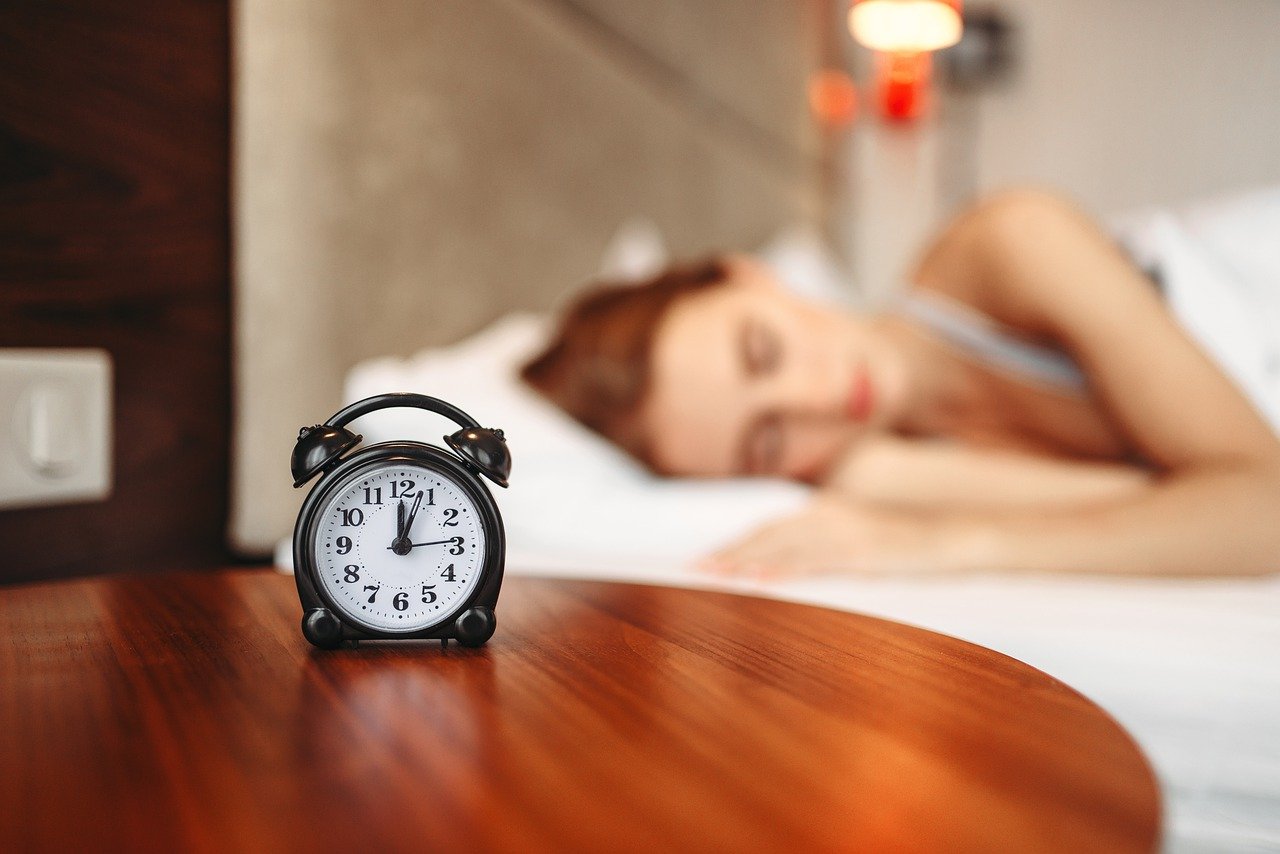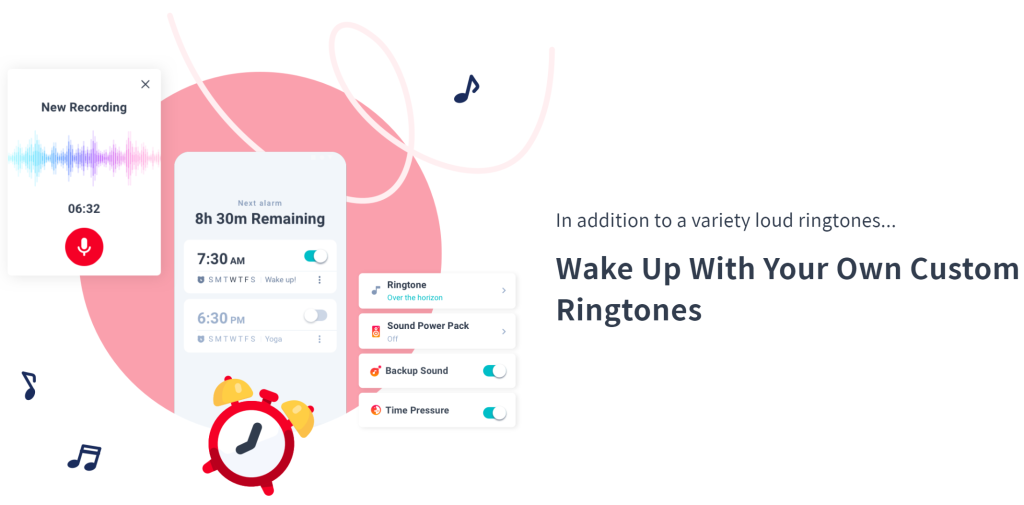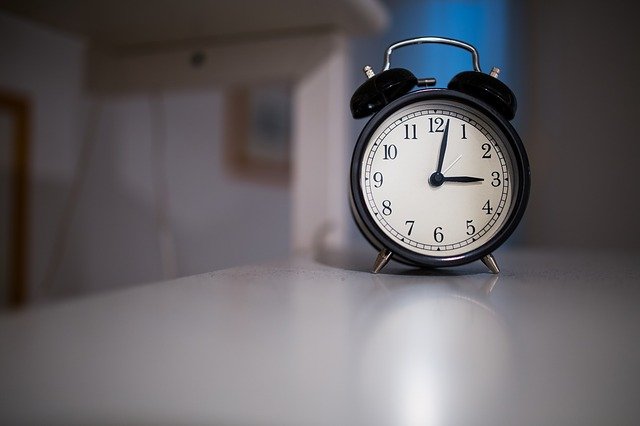Undersøk hvilken lyd som er best å våkne opp til og unngå søvninertien. Lær om alarmlyder og deres innvirkning på våkenhet og humør. Få nyttige tips for å ha en bedre opplevelse av å våkne opp.
Innholdsfortegnelse
We're all too familiar with the moment when our alarms go off, and we just can't find the courage to jump out of bed. It's even harder in the colder and darker months - that’s because our bodies are programmed to produce more melatonin in winter, known as the ‘sleepy hormone’.
This can lead to sleep inertia in the morning where you feel groggy, confused, and exhausted. And how you feel when you wake up is also influenced by other factors too, including genes, lifestyle, and quality of sleep.
At Startle, we know the impact music can have on our behavior and emotions, so it was no surprise to us that our choice of alarm could be partially to blame.

What are the good and bad alarms?
We conducted a review of scientific evidence and found that the perfect alarm has a melody you can sing or hum along to, a dominant frequency around 500 Hz or in the key of C5, and is not too fast or too slow (100 – 120 beats per minute is ideal). We then tested each default iPhone alarm sound against these three criteria to rank them from best to worst.
‘Sencha’ is crowned as the best iPhone alarm to wake up to, reducing your risk of waking up on the wrong side of the bed thanks to its easy melody played in key C, BPM of 110, and low frequency (500 Hz).
‘By the Seaside’ and ‘Uplift’ also share many of the same characteristics that help the mind and body wake up gently and minimize the risk of unpleasant sleep inertia.

How do alarm clocks work?
Luke Cousins, Physiology Regional Lead at Nuffield Health explains:
The study suggests the worst iPhone alarms to wake up to are Presto, Signal, Radar, Beacon, and Chimes based on their risk of jolting you awake and promoting sleep inertia. These sounds lack melody, instead favoring short and sharp bursts of noise and have much higher frequencies than recommended.
Se også
What else can we do to wake up on the right side of bed?
Luke also recommends these tips:
- Get to know your internal clock
- Keep a consistent sleep-wake schedule
- Use progressive sounds
Understanding your genetic chronotype can help you figure out the best time for you to wake up. If you’re naturally a night owl – it may be easier for you to wake up a bit later and if you’re an early bird, go to bed at a sensible time.
Waking up at the end of a sleep cycle, when you’re sleeping the lightest, is the best way to wake up feeling refreshed. This is also when it is easiest for external stimuli, like noise and light, to wake you up.
Establishing a regular sleep routine can help regulate your internal clock and make waking up easier. Try to go to bed and wake up at the same time every day, even on weekends.
A sound that starts relatively quiet and calm and gets progressively loud and energizing is most effective in waking you up gently. This gradual transition helps your body adjust to the wakeful state without feeling startled or disoriented. Consider using an alarm tone that starts light and builds up to the chorus or invest in an alarm clock that has progressive tones built into it.
By following these tips and choosing an alarm sound that meets the criteria mentioned earlier, you can improve your waking experience and reduce the risk of sleep inertia. Remember, waking up feeling refreshed and energized sets the tone for the rest of your day!

Hva vil Wiki fortelle oss?
Infrasound, sometimes referred to as low frequency sound, describes sound waves with a frequency below the lower limit of human audibility (generally 20 Hz, as defined by the ANSI/ASA S1.1-2013 standard). Hearing becomes gradually less sensitive as frequency decreases, so for humans to perceive infrasound, the sound pressure must be sufficiently high. Although the ear is the primary organ for sensing low sound, at higher intensities it is possible to feel infrasound vibrations in various parts of the body.
20 Hz is considered the normal low-frequency limit of human hearing. When pure sine waves are reproduced under ideal conditions and at very high volume, a human listener will be able to identify tones as low as 12 Hz. Below 10 Hz it is possible to perceive the single cycles of the sound, along with a sensation of pressure at the eardrums.
One study has suggested that infrasound may cause feelings of awe or fear in humans. It has also been suggested that since it is not consciously perceived, it may make people feel vaguely that odd or supernatural events are taking place.
In research conducted in 2006 focusing on the impact of sound emissions from wind turbines on the nearby population, perceived infrasound has been associated to effects such as annoyance or fatigue, depending on its intensity, with little evidence supporting physiological effects of infrasound below the human perception threshold. Later studies, however, have linked inaudible infrasound to effects such as fullness, pressure or tinnitus, and acknowledged the possibility that it could disturb sleep.
High volume levels at concerts from subwoofer arrays have been cited as causing lung collapse in individuals who are very close to the subwoofers, especially for smokers who are particularly tall and thin.
In September 2009, London student Tom Reid died of sudden arrhythmic death syndrome (SADS) after complaining that "loud bass notes" were "getting to his heart". The inquest recorded a verdict of natural causes, although some experts commented that the bass could have acted as a trigger.
Human reactions to infrasound may vary, with some perceiving it as awe-inspiring or fear-inducing, while others may feel discomfort or fatigue. Additionally, there is evidence that infrasound could disturb sleep and cause symptoms such as fullness, pressure, or tinnitus. It is important to note that high volume levels of infrasound, particularly from subwoofers at concerts, can potentially have harmful effects, including lung collapse. Infrasound has also been implicated in cases of sudden arrhythmic death syndrome (SADS). Therefore, the impact of infrasound on individuals can vary and should be considered when evaluating its effects.












